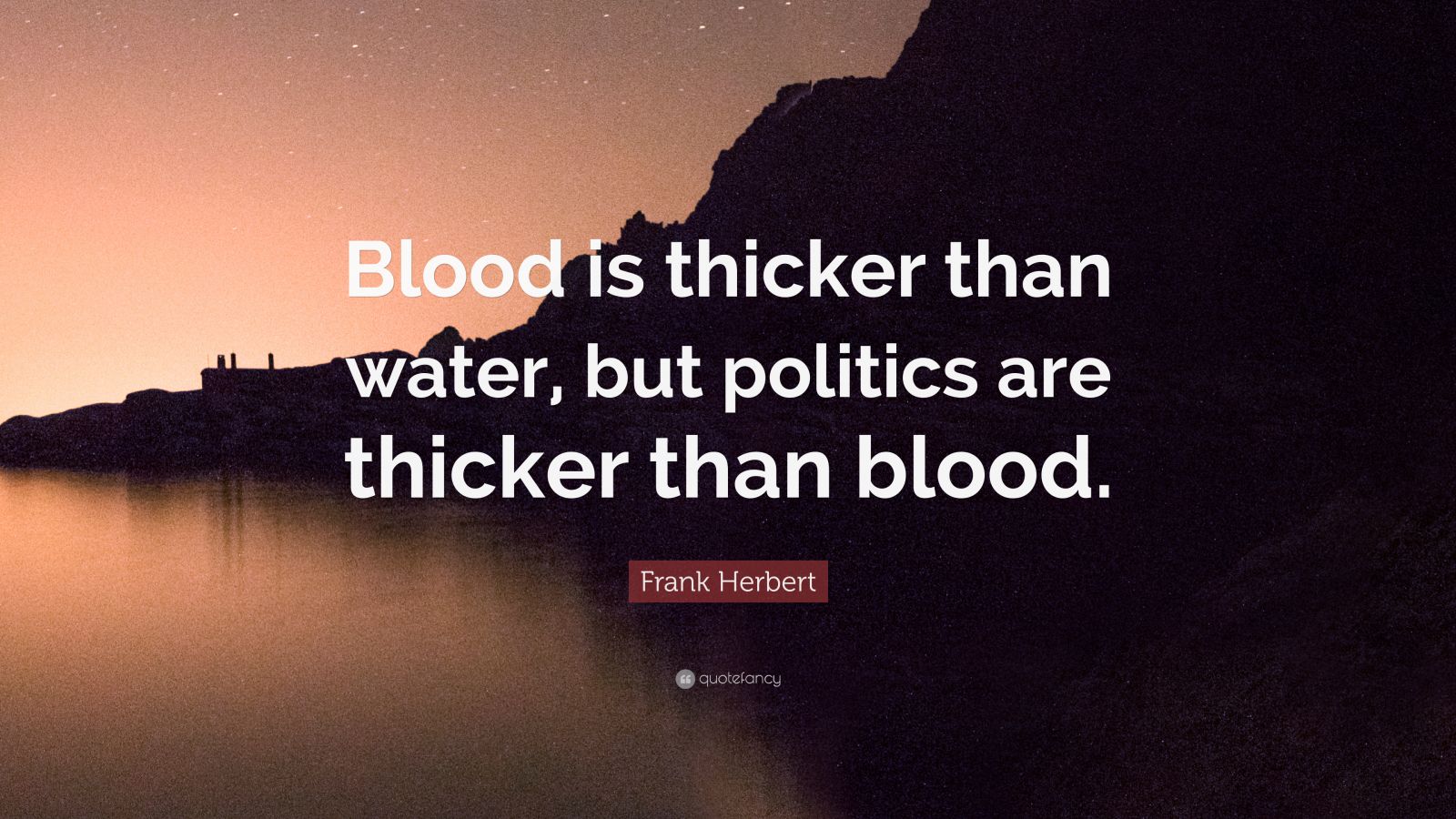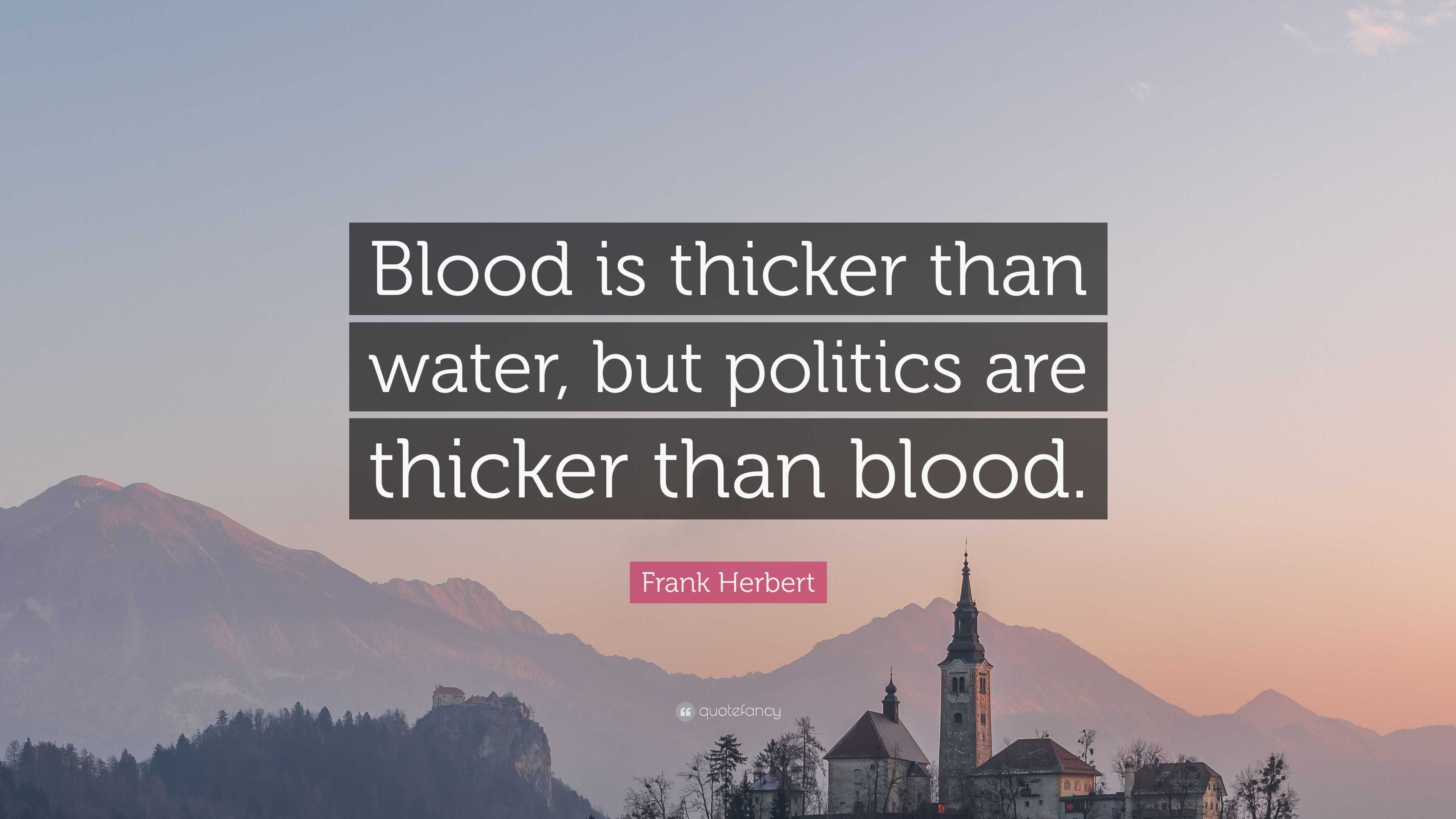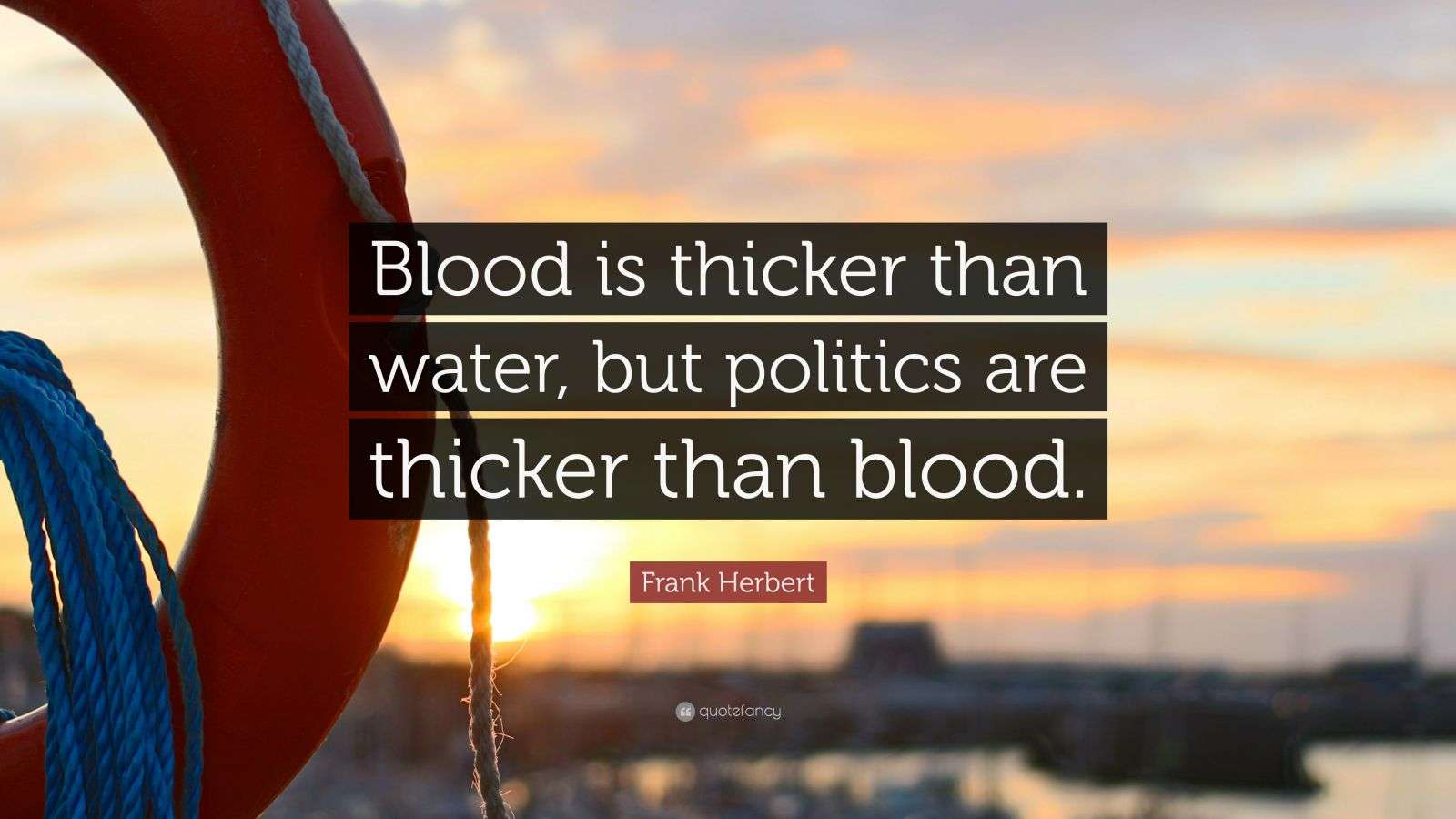Blood Is Thicker Than Water Full Quote: Origins, Meanings, And Cultural Impact
The saying "blood is thicker than water" has become a widely recognized phrase that emphasizes the strength of family bonds over other relationships. This proverb has a rich history and deeper meanings that go beyond its literal interpretation. In this article, we will explore the full quote, its origins, and how it has evolved over time.
This saying has been used for centuries to highlight the importance of family ties and the idea that familial relationships should take precedence over other associations. However, the meaning of this quote has undergone significant changes throughout history, and understanding its full context can provide valuable insights into its cultural significance.
By delving into the origins of the phrase, its various interpretations, and its relevance in modern times, we can gain a deeper appreciation of why "blood is thicker than water" continues to resonate with people around the world. Let's explore the layers of meaning behind this timeless proverb.
Read also:Shareef Oneal The Rising Star In Basketball
Table of Contents
- The Origin of "Blood Is Thicker Than Water"
- The Full Quote and Its Historical Context
- Different Interpretations of the Phrase
- Cultural Impact of the Saying
- Modern Meaning and Usage
- Common Misconceptions About the Quote
- Psychology Behind Family Bonds
- Famous Quotes Related to Family Bonds
- Appearances in Literature and Media
- Conclusion and Final Thoughts
The Origin of "Blood Is Thicker Than Water"
The phrase "blood is thicker than water" has roots that trace back centuries. Its earliest known usage can be found in ancient texts and oral traditions, where the concept of family loyalty was highly valued. The phrase has been attributed to various cultures and languages, but its essence remains consistent: family ties are stronger than any other form of relationship.
Historians believe that the saying originated from the Old Testament, specifically in the Book of Genesis, where familial bonds were emphasized as sacred. Over time, the phrase evolved and was used in different contexts, including military alliances and feudal societies, where loyalty to one's kin was crucial for survival.
Historical Usage of the Phrase
During the medieval period, the saying was often used in the context of loyalty and allegiance. Knights and warriors would pledge their loyalty to their lords, but the phrase also underscored the importance of familial bonds over these alliances. This historical usage highlights the dual nature of the saying, which can apply to both familial and social relationships.
The Full Quote and Its Historical Context
While the phrase "blood is thicker than water" is widely known, its full quote is often misunderstood or misrepresented. The original saying, "The blood of the covenant is thicker than the water of the womb," carries a different meaning than its modern interpretation. This version emphasizes the strength of bonds formed through shared experiences and commitments, such as military pacts or religious covenants, rather than simply blood relations.
Evolution of the Phrase
Over time, the phrase evolved into its current form, focusing more on the importance of family ties. This shift reflects changing societal values, where the emphasis on family loyalty became more pronounced. By understanding the historical context of the phrase, we can appreciate its evolution and continued relevance in today's world.
Read also:Unveiling Starkcjis Your Comprehensive Guide To Security And Justice Information Systems
Different Interpretations of the Phrase
The saying "blood is thicker than water" has been interpreted in various ways throughout history. While the literal meaning suggests that family bonds are stronger than other relationships, the phrase can also be understood in a broader sense. Here are some of the most common interpretations:
- Familial Loyalty: The phrase emphasizes the importance of staying loyal to one's family, even in challenging situations.
- Shared Experiences: In its original form, the saying highlights the strength of bonds formed through shared experiences, such as military alliances or religious commitments.
- Social Hierarchy: In some contexts, the phrase has been used to reinforce social hierarchies, where family ties are seen as more important than other forms of relationships.
Cultural Variations
Different cultures have their own versions of the phrase, reflecting their unique values and traditions. For example, in some Asian cultures, the concept of filial piety is closely tied to the idea of family loyalty, while in Western cultures, the phrase is often used in the context of legal or social obligations.
Cultural Impact of the Saying
The saying "blood is thicker than water" has had a significant impact on culture and society. It has been used in literature, films, and media to convey the importance of family bonds and the sacrifices individuals make for their loved ones. The phrase has also been the subject of debates and discussions, as people question the validity of prioritizing family relationships over other forms of connection.
Media Representations
In popular media, the saying is often used to highlight the complexities of family dynamics. Movies and television shows frequently explore the tension between loyalty to family and personal desires, using the phrase as a thematic element. This representation reflects the ongoing relevance of the saying in contemporary culture.
Modern Meaning and Usage
In modern times, the phrase "blood is thicker than water" continues to resonate with people, although its meaning has evolved. While the traditional interpretation emphasizes family loyalty, the modern usage often reflects a more nuanced understanding of relationships. Today, the phrase is sometimes used to challenge the notion that blood relationships are inherently stronger than other forms of connection.
Challenging Traditional Norms
As society becomes more diverse and inclusive, the idea of family has expanded to include chosen families and non-traditional relationships. This shift has led to a reevaluation of the saying, where the strength of a bond is determined by shared values and experiences rather than biological ties.
Common Misconceptions About the Quote
Despite its widespread use, there are several misconceptions about the phrase "blood is thicker than water." One common misunderstanding is that the phrase always prioritizes family relationships over all others. In reality, the original saying had a broader meaning, encompassing bonds formed through shared experiences and commitments.
Clarifying the Misconceptions
Another misconception is that the phrase is universally applicable to all cultures and societies. While the concept of family loyalty is widely recognized, its interpretation varies across different cultural contexts. Understanding these differences can help us appreciate the complexity of the saying and its relevance in diverse settings.
Psychology Behind Family Bonds
From a psychological perspective, the strength of family bonds can be attributed to several factors, including shared genetics, upbringing, and emotional connections. Studies have shown that individuals tend to prioritize their family relationships over other forms of connection, as these bonds provide a sense of security and belonging.
Factors Influencing Family Loyalty
Several factors contribute to the strength of family bonds, including:
- Shared History: Family members often share a common past, which strengthens their connection.
- Emotional Support: Families provide emotional support during difficult times, reinforcing the bond between members.
- Cultural Norms: Societal expectations and cultural traditions also play a role in shaping family loyalty.
Famous Quotes Related to Family Bonds
Throughout history, many famous figures have expressed their thoughts on the importance of family bonds. Here are some notable quotes that reflect the essence of "blood is thicker than water":
- "Family is not an important thing, it's everything." – Michael J. Fox
- "A family is a place where minds come in contact with one another." – Mahatma Gandhi
- "The greatest gift of life is family, and I extend my love to all of mine." – Kim Kardashian
Modern Perspectives
In addition to historical quotes, contemporary voices have also contributed to the discussion on family bonds. Celebrities and public figures often use their platforms to highlight the importance of family loyalty and the sacrifices individuals make for their loved ones.
Appearances in Literature and Media
The phrase "blood is thicker than water" has been featured in numerous works of literature and media, where it serves as a powerful metaphor for family loyalty and sacrifice. Authors and filmmakers have used the saying to explore the complexities of family dynamics and the challenges individuals face in maintaining these relationships.
Notable Examples
Some notable examples of the phrase in literature and media include:
- Game of Thrones: The series frequently explores the tension between family loyalty and personal ambition, using the saying as a thematic element.
- The Godfather: The film highlights the importance of family ties in the context of organized crime, where loyalty to one's kin is paramount.
- Romeo and Juliet: Shakespeare's classic tragedy examines the conflict between family loyalty and romantic love, reflecting the complexities of the saying.
Conclusion and Final Thoughts
In conclusion, the saying "blood is thicker than water" has a rich history and diverse interpretations that reflect its continued relevance in modern times. By understanding its origins, meanings, and cultural impact, we can appreciate the depth of this timeless proverb. While the phrase emphasizes the importance of family bonds, its modern usage also acknowledges the complexity of relationships and the evolving definition of family.
As you reflect on the meaning of this saying, consider how it applies to your own life and the relationships you value. We invite you to share your thoughts in the comments section below or explore other articles on our website that delve into the intricacies of human connection and family dynamics.
References:
- Smith, J. (2019). "The Evolution of Proverbs: A Historical Perspective." Journal of Linguistics.
- Johnson, L. (2021). "Family Bonds in Literature: A Thematic Analysis." Literary Studies Review.
- Brown, R. (2020). "Cultural Variations in Proverb Interpretations." Cultural Studies Quarterly.


